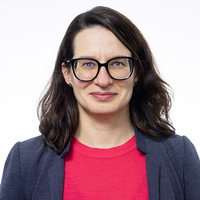Sara Vieira-Silva
Human Microbiome Ecology

Our research focuses on understanding the ecological dynamics of human gut-associated microbial communities in healthy host-microbiome homeostasis and how their disturbance contributes to the risk of disease onset or progression. We apply quantitative multi-omics approaches to population cohorts and intervention trials to identify the mechanisms that drive the dynamics of the gut ecosystem in health, the determinants of its resilience to perturbations, and the alterations that contribute to disease (dysbiosis).
Dysbiosis is considered one of the hallmarks of ageing. With age, humans gradually acquire a larger set of colonisers through diet, social interactions and environmental exposure. However, ageing is also associated with an increased prevalence of dysbiosis, characterised by an abrupt loss of microbial diversity and a dramatic reduction in the abundance of keystone species. Dysbiosis can be linked to a more pronounced systemic inflammatory tone, an associated increased susceptibility to age-associated disease and, specifically among elderly individuals, a decline to frailty.
By assessing microbiome variation across age gradients in population cohorts, we aim to disentangle health- and lifestyle-associated environmental, as well as microbiome-intrinsic drivers of gut ecosystem stability and resilience to perturbation in healthy ageing. The ultimate aim is the development of novel microbiota modulation strategies to prevent or counter the development of age-associated dysbiosis.
Positions held
- Since 2022: Professor of Mucosal Microbiology and Immunology, University Medical Center (UMC), Mainz and Adjunct Director, Institute of Molecular Biology (IMB), Mainz, Germany
- 2015 - 2022: Postdoctoral researcher, Catholic University of Leuven (KU Leuven), Leuven, Belgium
- 2011 - 2015: Postdoctoral researcher, Free University of Brussels (VU Brussel), Brussels, Belgium
- 2010 - 2011: Postdoctoral researcher, Institut Pasteur, Paris, France
Education
- 2010: PhD in Genomics, Institut Pasteur, Paris, France and Université Pierre et Marie Curie (Paris 6), Paris, France
- 2006: PhD programme in Computational Biology (PDBC), Instituto Gulbenkian de Ciência, Oeiras, Portugal
- 2003: Diploma in Biology, University of Lisbon (FCUL), Portugal
Selected publications by Sara Vieira-Silva
Valles-Colomer M*, Bacigalupe R*, Vieira-Silva S*, Suzuki S, Darzi Y, Tito RY, Yamada T, Segata N, Raes J* and Falony G* (2022) Variation and transmission of the human gut microbiota across multiple familial generations. Nat Microbiol, 7:87–96 (*indicates joint contribution) Link
Vieira-Silva S*, Falony G*, Belda E*, Nielsen T, Aron-Wisnewsky J, Chakaroun R, Forslund SK, Assmann K, Valles-Colomer M, [MetaCardis Consortium: 90 authors], Stumvoll M, Vestergaard H, Zucker JD, Bork P, Pedersen O, Bäckhed F, Clément K and Raes J (2020) Statin therapy is associated with lower prevalence of gut microbiota dysbiosis. Nature, 581:310–315 (*indicates joint contribution) Link
Valles-Colomer M*, Falony G*, Darzi Y, Tigchelaar EF, Wang J, Tito RY, Schiweck C, Kurilshikov A, Joossens M, Wijmenga C, Claes S, Van Oudenhove L, Zhernakova A, Vieira-Silva S* and Raes J* (2019) The neuroactive potential of the human gut microbiota in quality of life and depression. Nat Microbiol, 4:623–632 (*indicates joint contribution) Link
Vandeputte D*, Kathagen G*, D’hoe K*, Vieira-Silva S*, Valles-Colomer M, Sabino J, Wang J, Tito RY, De Commer L, Darzi Y, Vermeire S, Falony G* and Raes J* (2017) Quantitative microbiome profiling links gut community variation to microbial load. Nature, 551:507–511 (*indicates joint contribution) Link
Falony G*, Joossens M*, Vieira-Silva S*, Wang J*, Darzi Y, Faust K, Kurilshikov A, Bonder MJ, Valles-Colomer M, Vandeputte D, Tito RY, Chaffron S, Rymenans L, Verspecht C, De Sutter L, Lima-Mendez G, D’hoe K, Jonckheere K, Homola D, Garcia R, Tigchelaar EF, Eeckhaudt L, Fu J, Henckaerts L, Zhernakova A, Wijmenga C and Raes J (2016) Population-level analysis of gut microbiome variation. Science, 352:560–564 (*indicates joint contribution) Link
